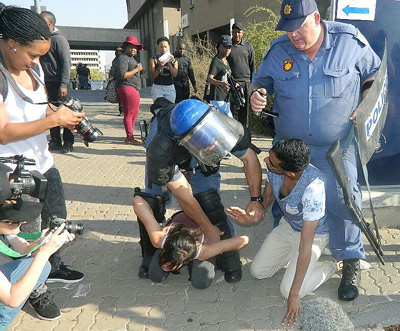
As university students across the country intensify their demand for free education under the banner of #FeesMustFall, their cause has not been peaceful with incidents of violence being widely reported. Those who are sympathetic are getting worried that the violence associated with the students’ protests is sabotaging their legitimate claim which is in line with the Freedom Charter that there shall be free and compulsory education.
In 2015, the violent scenes outside Parliament on the 21st of October marked #FeesMustFall as a campaign that would be met by the full, militarised might of the police.
The images and sounds of stun grenades, students scurrying for cover, the human chain by mainly white students from UCT to prevent the arrests of their protesting black counterparts, students amongst them women being manhandled and dragged to the ground by members of the Public Order Policing unit at the Parliament precinct are etched in the memory of many students and South Africans.

In 2016, a picture of a student from Rhodes University being dragged across the road by police to a van has become a symbol of police brutality against the students.
Meanwhile at the University of Johannesburg, a lecture hall was damaged. There is a video circulating from the University Currently Known As Rhodes showing police assaulting students. At Wits where petrol bombs were discovered, Celumusa Ntuli, a cleaner employed by an outsourced company, died allegedly from inhaling the fumes from a fire extinguisher that was set off by protesting students. Other students at Wits were injured and arrested. After some classes were burnt at Turfloop University in Limpopo, police and private security guards reacted and some students were injured.
Higher Education Minister Blade Nzimande was recently quoted as saying the damage to university property as a result of student protests is estimated at R600-million. Who should be blamed for this violence? University management are pointing fingers at the students and students in turn are pointing fingers back at management.
“We don’t condone any violence irrespective of where it comes from because it won’t solve anything. The commotion started when students forced themselves into the administration block attempting to disrupt classes and when the security tried to stop them they started hurling rocks at them,” said Shirona Patel, Wits Spokesperson.
She added that they don’t have control over the police when protests are happening on the street and said the injured students were treated at the campus wellness centre and others are recovering in hospital.
“We were down on our knees, raising our hands as a sign of peace, I can even show you the video but instead we were brutally manhandled, kicked and shoved around by the police and the security. We had no choice but to act in self-defence,” said Fasiha Hassan, Secretary of the Students Representative Council (SRC) at Wits University.
She said that their march was peaceful throughout and was only spoiled by the presence of the police, despite their constant warnings to the university management that the presence of police and security is problematic and provocative to students.
“For our fellow students who were wrongfully arrested, we have opened a case of assault with intent to cause grievous bodily harm against the police. And those who are injured we want university management to pay for their medical bills,” she said.
The police said incidents of police brutality will be investigated. “There has been communication recently with the students to avoid such situations. They made a commitment that they will try to avoid rogue elements and all allegations against the police will be investigated,” said Colonel Lungelo Dlamini, spokesperson of the South African Police Service (SAPS).
Gareth Newham from the Institute of Security Studies believes the only way to avoid violence at #feesmustfall protests is when all parties involved sit around a table to resolve their issues amicably. Otherwise, the coming protests of the students will continue to be mired in violence, the destruction of property and police brutality.
“Police are not called to the scene to cause violence or be brutal but to maintain law and order, to quell any incidents of criminality and prevent the destruction of property. By law they can exercise a minimum force when someone is resisting arrest,” he said.
According to him, private security employed by universities must not be involved in student protests because that is not what they are trained for. They are trained to monitor access to the university premises not public order policing nor the use of rubber bullets, pepper spray or teargas, he said.
When Elitsha visited the University of Stellenbosch last year on the morning of the 21st of October last year, we were greeted by a group of men in black jackets and pants.
As protestors made their way to various departments and lecture halls calling on other students to join them in the protest, some of the men in black followed after together with the police. More still manned the entrances.
On the 30th of October at the University of the Western Cape, we came across the same faces we saw at Stellenbosch University the week before. After ignoring the call to a meeting from students, UWC hired the services of Vetus Schola,a paramilitary security company linked to right-wing apartheid-era military veterans.
The same security company re-emerged at the University of Cape Town this year. Vetus Schola was used by Anglo American in 2012 to provide security during a strike at Kumba Iron Ore’s Sishen mine. Farm owners in the Western Cape also used their services during the farmworkers strike of 2012.
Most of those who were deployed at UWC had foreign accents that suggested they were from the DRC. Pictures of private security guards in a police van have been circulating on social media and people are concerned about the collusion between private security companies and the SAPS.




 en
en